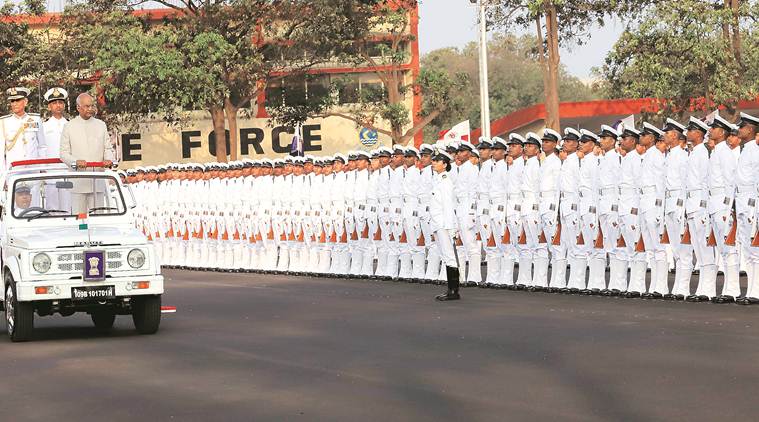 President Ram Nath Kovind receives a guard of honour at INS Shivaji in Lonavala on Thursday; (below) he presents the prestigious President’s Colour to INS Shivaji. (Express photo by Pavan Khengre)
President Ram Nath Kovind receives a guard of honour at INS Shivaji in Lonavala on Thursday; (below) he presents the prestigious President’s Colour to INS Shivaji. (Express photo by Pavan Khengre)
The present geopolitical situation in the world, and in the Indo-Pacific in particular, demands greater vigilance and the Indian Navy has adopted mission-based deployments in the Indian Ocean region, President Ram Nath Kovind said at the INS Shivaji at Lonavala on Thursday.
Kovind made the remarks after he presented the prestigious President’s Colour to INS Shivaji, Indian Navy’s premier technical training institute, in a ceremonial parade held at Lonavala near Pune on Thursday.
Presentation of Colour or Standards is said to be an acknowledgement of the meritorious service rendered by the selected units over the years and is done at the hands of Supreme Commander of the Armed Forces. While the practice of carrying the Colour, which is a flag, into battle has been left behind, the tradition of receiving, holding and parading the Colour continues even today in the Indian armed forces.
In his address to sailors, Navy officers and citizens, Kovind said, “Today, the geopolitical situation in the world and in the Indo-Pacific in particular demands greater vigilance. I am aware that the Navy has adopted mission-based deployments in the Indian Ocean region. High-quality training of marine engineers is crucial for sustained deployments and presence in our areas of interest. The future will also see great diversity in the propulsion systems, ranging from conventional to nuclear and electric and hybrid propulsion. Concepts of maintenance will also undergo a paradigm shift with increased requirements on operational availability of platforms. INS Shivaji will need to impart the requisite skills to all trainees to prepare them to meet future challenges.”
INS (Indian Naval Ship) Shivaji was commissioned as HMIS (His Majesty’s Indian Ship) Shivaji in 1945. The establishment has rendered 75 years of service to the nation by imparting training in engineering discipline to personnel of Indian Navy, Indian Coast Guard, other sister services and friendly foreign countries. INS Shivaji
has, till now, trained more than 2 lakh officers and sailors, both Indian and foreign, since its inception. All courses conducted at INS Shivaji are recognised by the All India Council for Technical Education.
On Thursday, the President’s Colour was received by the officer designated as Nishan Adhikari on behalf of INS Shivaji during a ceremonial parade comprising 130 officers and 630 sailors of the Indian Navy, and including a Guard of Honour. Commander Nilesh Koshi George led the parade.
During his address, the President also said, “A nation’s maritime interests are usually also linked to its economy and the well-being of its people. I am told about 90 per cent of our trade, by volume, is handled by sea routes. This enhances the role of the Indian Navy, not just in national security but also in economic security, and thus in the wider process of nation building. The Navy is India’s chief instrument of its sea power. It is also the guardian of the nation’s maritime interests, both military and civilian.
The nation is proud of the Navy’s commitment in protecting our maritime frontiers, securing our trade routes, and also extending a helping hand in times of civil emergencies.”
Today, INS Shivaji is spread over 861 acres on the Lonavala tableland and houses a population of 6,000, comprising 2,500 persons in uniform, including trainees and the families. The institution consists of several training bodies
like Centre of Marine Engineering and Technology, Centre of Excellence in Marine Engineering, School of Basic Sciences and the Nuclear Biological Chemical Defence School.